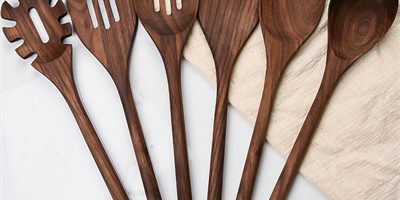Introduction: In the pursuit of eco-conscious living, our choices extend to even the simplest elements of our daily routines, including cooking. Wooden utensils, steeped in tradition and sustainability, have carved a niche for themselves in modern kitchens. This blog delves into the exquisite world of wooden utensils, exploring their artisanal craftsmanship, environmental merits, and how they infuse sustainability into culinary artistry.
A Testament to Craftsmanship: Wooden utensils embody the legacy of skilled craftsmanship passed down through generations. Crafted with care and precision, these utensils are not just tools; they are functional works of art that pay homage to the artisans who shape them. By choosing wooden utensils, you’re embracing the artistry of tradition in a world that values sustainability.
An Echo of Sustainability: The sustainability of wooden utensils is woven into their very essence. Sourced from renewable materials, they symbolize a return to nature’s abundance. Unlike utensils made from non-renewable resources, wooden utensils minimize their impact on the environment, making them a conscious choice for those seeking to tread lightly on the planet.
Aesthetic Harmony in the Kitchen: The tactile allure of wooden utensils extends beyond functionality. Their natural textures and earthy tones add a touch of warmth to modern kitchen spaces. The elegant simplicity of wooden utensils creates an ambiance that resonates with those who value both aesthetics and environmental responsibility.
Gentle Interaction, Impeccable Cookware: Wooden utensils come with a gentleness that enhances your culinary endeavors. They protect your cookware from scratches and abrasions, ensuring that your kitchen tools remain as beautiful and functional as the day you acquired them. This compatibility aligns with the values of sustainability, where longevity and resourcefulness are paramount.
Nourishment for Sustainable Living: Caring for wooden utensils is a ritual that nourishes their longevity. Hand wash them with mild soap and water, and occasionally treat them with food-safe oil to maintain their natural luster. This minimal maintenance not only preserves their beauty but also reflects a sustainable approach to ownership.
Conclusion: Wooden utensils are not just utensils; they are embodiments of sustainability and artistic craftsmanship. Their connection to artisanal traditions, environmental consciousness, aesthetic resonance, compatibility with cookware, and sustainable care practices all converge to create a culinary experience that extends beyond mere functionality. By welcoming wooden utensils into your kitchen, you’re not just embracing tools; you’re embracing a lifestyle that celebrates the intersection of art, nature, and sustainability.


















